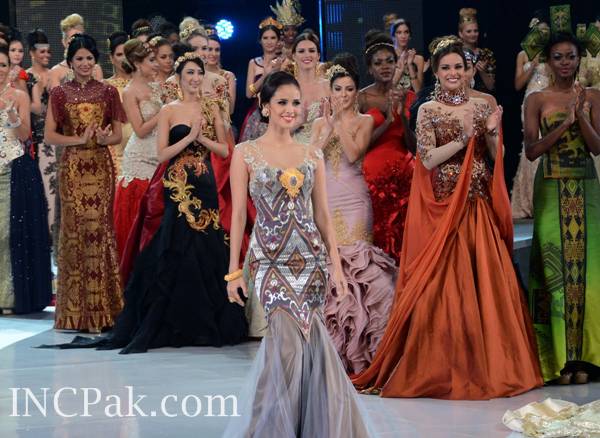Global beauty pageant Miss World has seen its fair share of criticism since it was first set up in 1951, with protests by the Women’s Liberation Movement in London, 1970 (“We’re not beautiful, we’re not ugly, we’re angry”) being perhaps the most notable.
Miss World 2013, hosted this year by Indonesia, is no exception – protests from day one, serious security threats and – most recently – a rival pageant for Muslim women, World Muslimah, which was quickly dubbed ‘Islam’s answer to Miss World’.
But organiser Julia Morley takes scrutiny in her stride. She is adamant that everyone is entitled to their own opinion and so – now that the 700-strong Miss World team (contestants included) are safe since relocating to Bali under government instruction – she seems relatively unfazed by criticism.
“Everyone has a right to protest. But it’s a shame is that no one comes and speaks to us before doing so,” she tells HuffPost UK Lifestyle. “How can people who are so passionate not care to find out the whole story?”
She adds: “During the Women’s Lib protests, no one came to me to ask questions. From a woman’s point of view, I found it rather confusing.”
Julia has been championing the philanthropic side of Miss World ever since taking over at the helm following her husband Eric Morley’s death in 2000. She is keen to show that the contest is more than just powder puffs and bikini beach wear rounds.
“Miss World empowers women – it gives them a voice,” says Julia. “And not just the 130 contestants who get to network, learn, grow and have fun for the month-long contest and beyond. But women across the world who are represented.”
Each Miss World contestant, she explains, brings a project from their native country as part of the Beauty With A Purpose campaign to generate awareness and fundraising (the organisation has raised £450m to date). For the following twelve months these projects become the focus for the newly-crowned Miss World, who will make visits and support the issues.
“I’m proud of what we do,” says Julia. “We work with incredible women – dentists who travel for miles to look after the teeth of the poverty-stricken; doctors committed to health and social problems. It’s fantastic to be able to support people.”
But the community-focussed nature of projects is often overshadowed by the glitz and glamour, paving the runway for criticism over women’s representation and objectification.
The epitome of this is the infamous bikini round, which Julia promptly removed in 2000 when she took over.
“I found it very out-dated to have girls gyrating on stage in their bikinis, so we got rid of it. It was a team decision, but something I felt strongly about,” she explains. “Some of the girls felt uncomfortable, they’re not trained dancers but doctors and nurses – so we swapped bikinis for a beach-wear round.”
“The round is also optional,” she adds. But in the last two years only one contestant has decided not to take part.
The bikini row ignited again this year after protesters objected to Miss World contestants wearing bikinis on the beach. A complaint, Julia hastens to add, that the Miss World team has happily compiled with opting to wear sarongs instead.



















